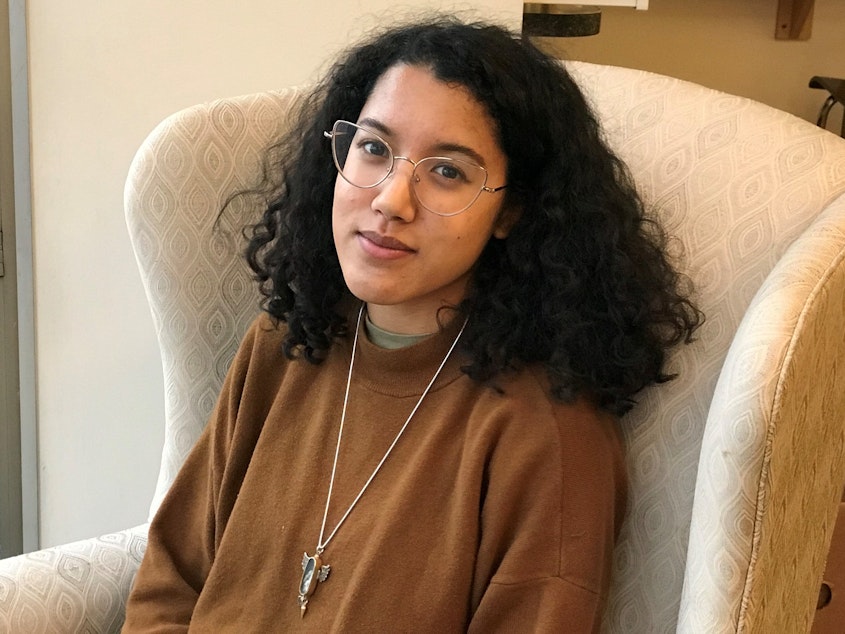Azura Tyabji says the city’s rapid growth this last year embodies her own childhood.
When KUOW asked Seattle’s Youth Poet Laureate to write a poem looking back at 2018, Tyabji came up with "206," a reflection of the changes both she and the city experienced.
I grew so quickly, my shins splintered.
My head, magnified and fractured,
estuaries in a single tear,
I devoured a mic and busted my lip, tried waltzing with phantom limbs
of communities that have since taken flight.
Azura tyabji
To find the structure for the poem, 18-year-old Tyabji says she had to dig into her childhood memories of the city to tell the story of Seattle and herself. She looked at what she and her hometown had in common — and how they are growing up alongside each other.
Seattle’s area code, 206, also happens to be the number of bones in the human body after adolescence. The poet wanted to capture how the city, along with her body and identity, are intertwined.
Where the city of growing giants and I will go from here, I’m not certain.
I hope we give our word and stick to it.
I hope we grow tender enough, again.
AZURA TYABJI
"Seattle feels like an adolescent to me because it’s going through so many rapid changes and it’s trying to reinvent itself with tech and being a global city," Tyabji said. "But who’s being left behind in such a transformation?"
The poet described some of her most visceral and emotional memories of the year. There the summer that looked dystopian with wildfire smoke, the friends of hers who either had to move out of Seattle or desperately searched for affordable housing, and hundreds of sweeps of the city’s homeless camps.
Read Tyabji's full poem below.
Fusing the tender spot on her skull was the first defense mechanism she learned.
Above her, buildings fused into barrel chested giants shivering hollow in the wind.
“The skull is an amphitheater,” grandma says
When I was still young in South Lake Union, I cradled a fallen sparrow’s head in the tenderness of my palm.
Beyond the endless breadth of my front yard, a concrete orchestra swelled
in a pitch I couldn’t hear.
I still speak to birds in whispers when I chase them from crumbs.
I used to try slamming the door to pull the tooth
but slacked my wrist before impact, every time.
On picture day, blood-gummed and grinning, a spoiled classroom
slowly emptied in my mouth.
The other girls used to say, “you can’t play with us because you’re poor and your skin isn’t the color of glass”
so I huddled in the sandbox, prayed for fire, and finally blended into my little corner.
Still, the tide found me. It rises higher every year, flushes
whole kids into different worlds,
only looks at them through the rearview mirror.
To keep the monsters from crawling up and taking me in the night, I used to stuff the border between my bed and the wall with pillows.
By the time I realized their threats were imaginary,
there was a broken trench of rosaries underneath my comfort,
scribbled treaties crumpled like receipts and thrown
away.
when I got older, I chased after the guy everyone else wanted.
I wanted to be his home so badly I eviscerated my bedroom into a vacant lawn,
crushed pots on my forehead and became the soil.
Concussed confetti raining from my question asked, over and over
“am I enough?”
“am I enough?”
“am I enough?”
“for you to take root here and stay?”
Some of us learn to stand taller by kicking
Some of us learn to stand taller by spinning in funhouse mirrors and August smoke
Some of us learn to stand taller through rumors that gust around us like a magic carpet
Some of us learn to stand taller by holding life hostage in a steel drum and leading the marching band alone
City grows up cold shouldered, stutters in and out of straight lines and a wobbling compass towards home.
She doesn't
text her parents when she gets home,
just scrapes her heels on the doormat and falls into a restless sleep
she prays someone will wake her up from.
206 bones are left in the body after development runs its course.
What a year of years it’s been.
I grew so quickly, my shins splintered.
My head, magnified and fractured,
estuaries in a single tear,
I devoured a mic and busted my lip, tried waltzing with phantom limbs
of communities that have since taken flight.
Where the city of growing giants and I will go from here, I’m not certain.
I hope we give our word and stick to it.
I hope we grow tender enough, again.





